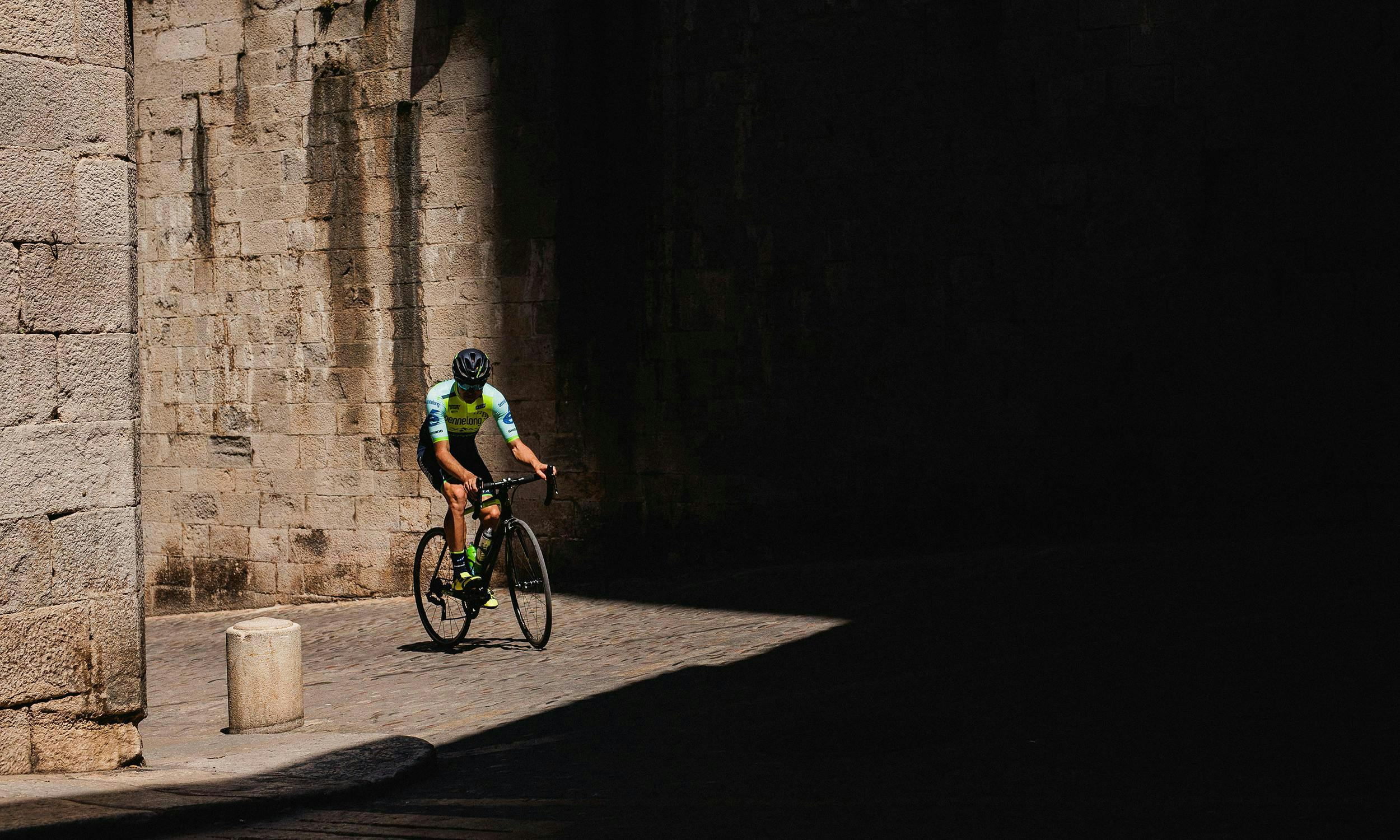
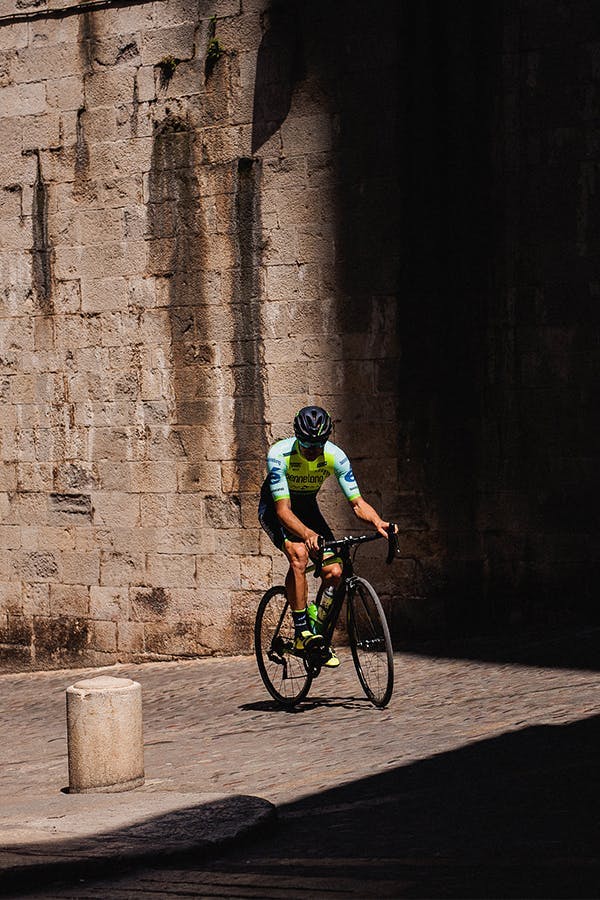


We recently caught up with Steele von Hoff in Girona, Spain to unpack an unbelievable sequence of events that occurred between February and June of this year.
This is a story illustrating how cycling is a sport that is lived in moments. Moments that reach the high peaks of triumph and moments that fall to the deep lows of defeat and misfortune. And when there’s no warning when the tide shifts, everything can change in the blink of an eye. It’s what we do in those moments that define us.
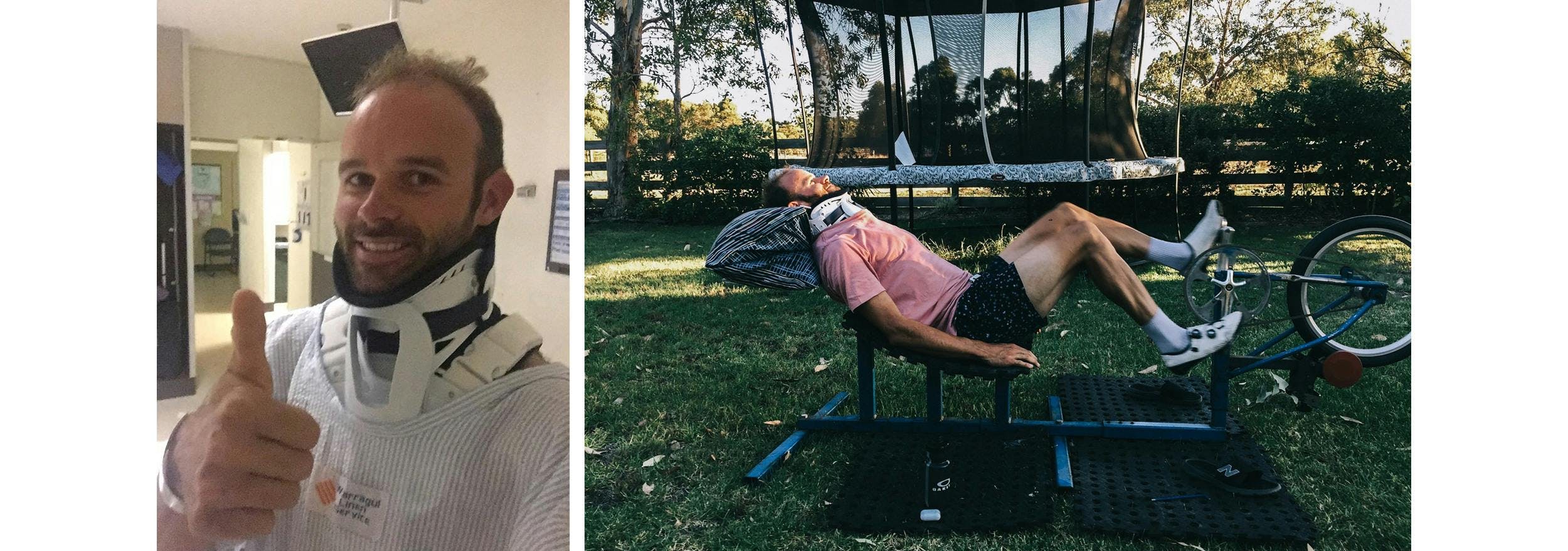
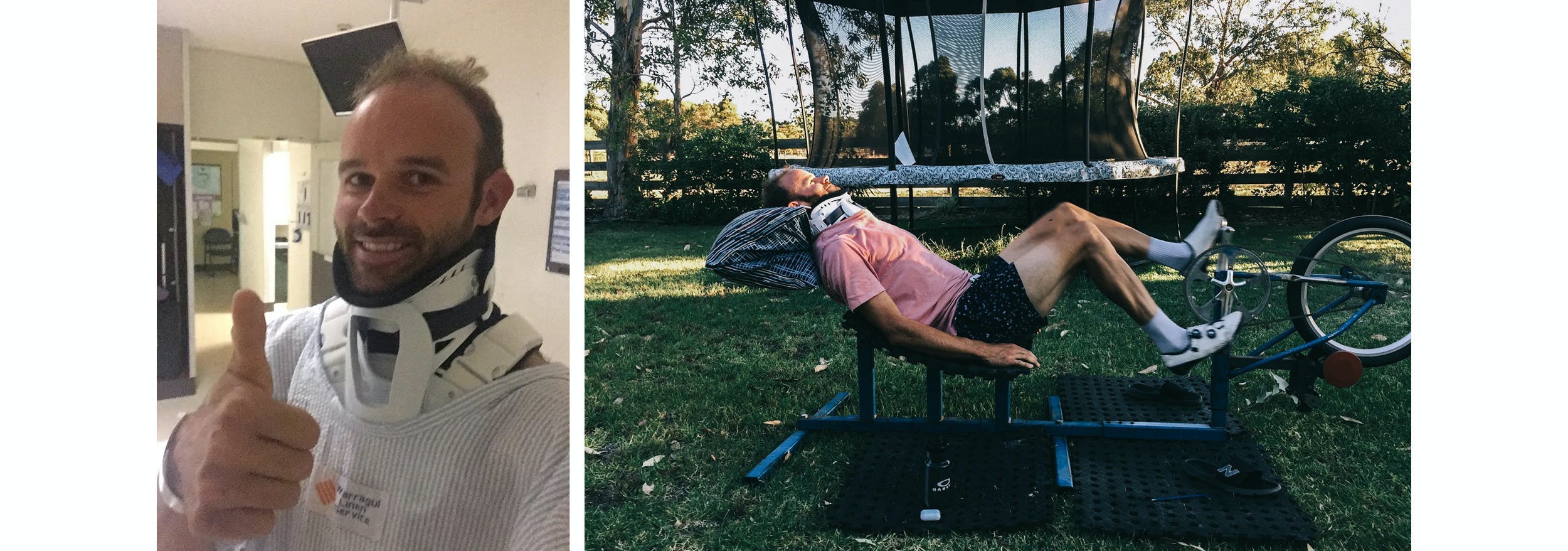
A Lost Memory
Steele von Hoff can’t remember the moment he first broke his back. He has a memory of seconds before the crash, when he is riding at 50 km/h. He can recall the feeling of his bike as it leaned into the gutter. The wind, strong and gusty on his side. But then, when it happened, he has only a memory of black right in front of his face.
A series of rapid flashes follow. The loud crunch of crashing bikes and carbon. The world spinning around. And a snapshot of the tarmac where he lay, gasping for breath.
“I still only have snapshots… I must have landed straight on my head, given the look of my helmet. And how concussed I was,” von Hoff says.
It’s April, 2018. Von Hoff is talking to me over the phone. He’s at Melbourne Airport, waiting to board a flight to Europe. The buzz from an airport announcer interrupts us every few minutes. He hasn’t had a moment of rest in the last 48-hours.
“It’s crazy,” he says, “this just doesn’t happen. But, it’s real. It’s right here in my bag.”
He is, of course, referring to the Commonwealth Games gold medal he had won only days earlier.
Speaking to him, I can hear the disbelief in Von Hoff’s voice. He tells me that it feels like a dream. But the gold medal, tucked safely in his bag, reminds him of his reality. He is the 2018 Commonwealth Games Road Race champion.
It is a far cry from where Von Hoff was only seven weeks before the Games, on the ground at the local Sandown criterium circuit with six broken vertebrae – two in his neck and four in his thoracic spine. In a matter of seconds, whilst racing his local criterium, his dream of representing Australia on the Gold Coast was thrown up into the air.
Von Hoff explains how he now relies on the memory of others to put together the events directly after the fall. He was told that he had walked around heavily concussed and went to check on the woman who had also fallen. He has some fragmented memory of hanging onto the barriers, arched over, and not being able to breathe.
“It’s hazy. But I do remember seeing my glasses frame and then my glasses lens, five metres apart on the ground. And I couldn’t understand why. I couldn’t work it out.”
“The next thing I remember is a paramedic’s face in front of mine, and him telling me, it’s okay I'm going to look after you.”
Later, in the ambulance, von Hoff kept asking the same question over and over again. ‘Who's selected for the Commonwealth Games? Who's selected for the Commonwealth Games?’
He had received the call a few days earlier. He had been selected in the Australian team for the Commonwealth Games Road Race. It was a dream come true. But now, concussed, Von Hoff wasn’t sure if the memory was real or imagined. Was the team public yet? So he asked, over and over again, until it was confirmed he had indeed been selected. Whether he would actually race or not was now another question entirely.
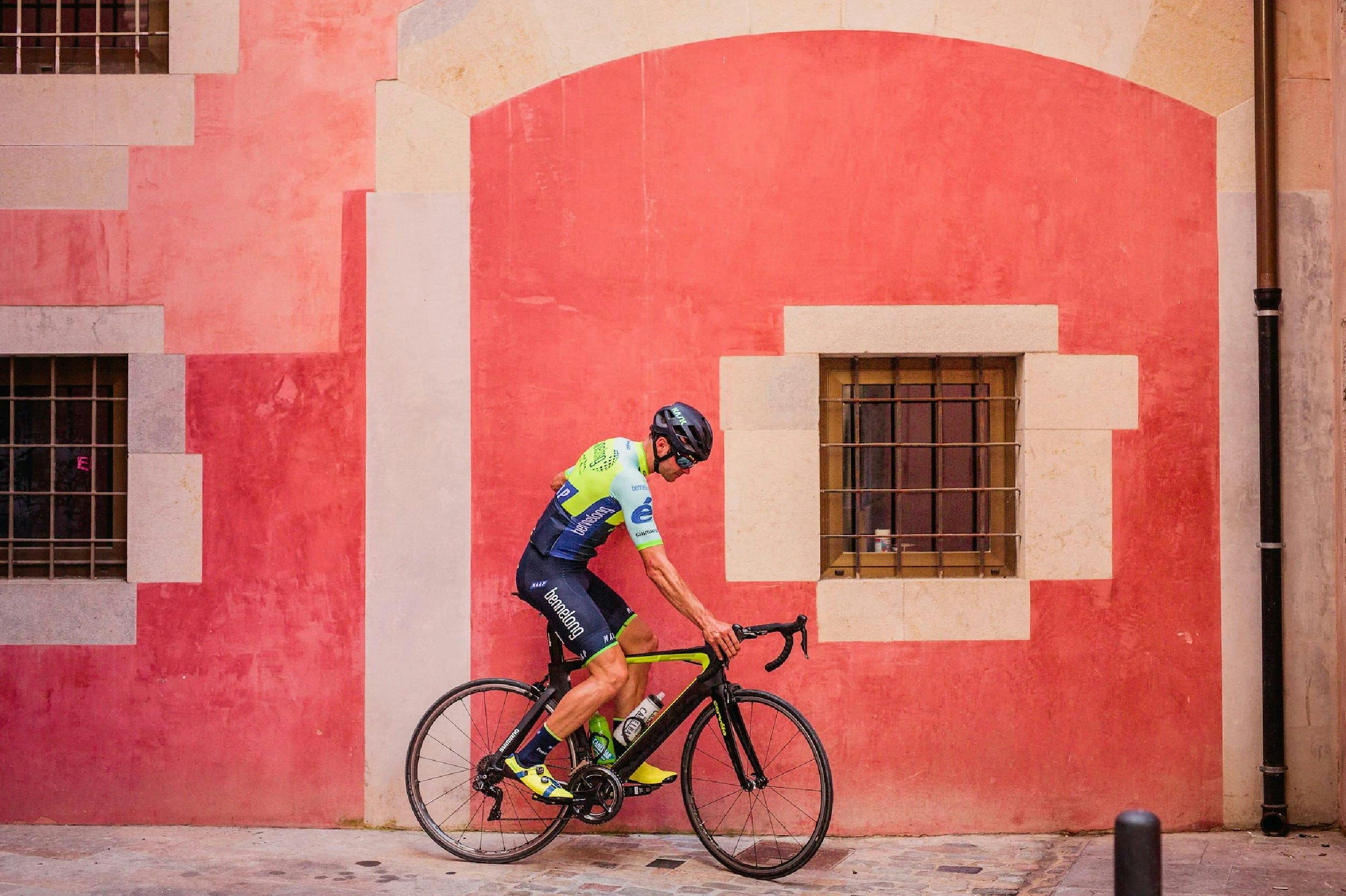

An Unbroken Spirit
After arriving at the hospital, von Hoff started to get worried. He didn’t just have a bruise or skin-off his body, like so many crashes before. He could tell that this was far more serious.
“I was laying there, unable to really move. And I remember thinking to myself: Okay, I haven’t lost any feeling. Nothing was numb. That’s good. I might be alright, I thought, I might not be too badly injured.”
The doctors returned with von Hoff’s scans and results. They told him that, along with the concussion, he had six different broken vertebrae. He recalls a sinking feeling, deep within his stomach, suddenly weighing him down.
“It was so disheartening. It isn’t an injury you can normally just bounce back from. Initially, I just thought, that’s me potentially done.”
He began thinking about taking on more work. He had been working as welder since he returned to Australia at the start of the year, and maybe he could do more hours there. He was still concussed, but even then he quickly realised: he couldn’t do that. There was no way he could lift anything.
“I had nothing else I could do, so I decided right then – ‘I am just going to keep pedalling. I have to keep pedalling.’”
Still strapped to the bed, von Hoff made some phone calls. He organised for a recumbent bike to be delivered to his house. He needed it there, ready for his return home.
“Once I got to the point where I could walk again, and I could go to the bathroom on my own, I knew I could get back to spinning the legs,” he says. “Within six days of the accident, I was on the recumbent, turning my legs over again. It’s all I could do.”
The weeks that followed, however, were not a motivational ‘Rocky’ montage. Von Hoff was in a bad way, and recovery was a painful and mentally fatiguing process. Looking back on that time, von Hoff reflects that there were moments when it all seemed too much.
“There were times when I wanted to throw in the towel because I was in such a bad way,” he tells me. “There were just a few moments when I had to call my coach Fenz [Mark Fenner], and just chat with him about everything, to help me get by.”
Von Hoff says it was these calls with his coach, Mark Fenner, that helped him maintain his belief in himself. Fenner gave him the motivation he needed and reminded von Hoff that so many people were in his corner supporting him. So, he kept pedalling. He went to the physiotherapist twice a week. He did his exercises every day, morning and night. Every waking moment became about returning to fitness and having proper movement.
“There was no way I could give in.”
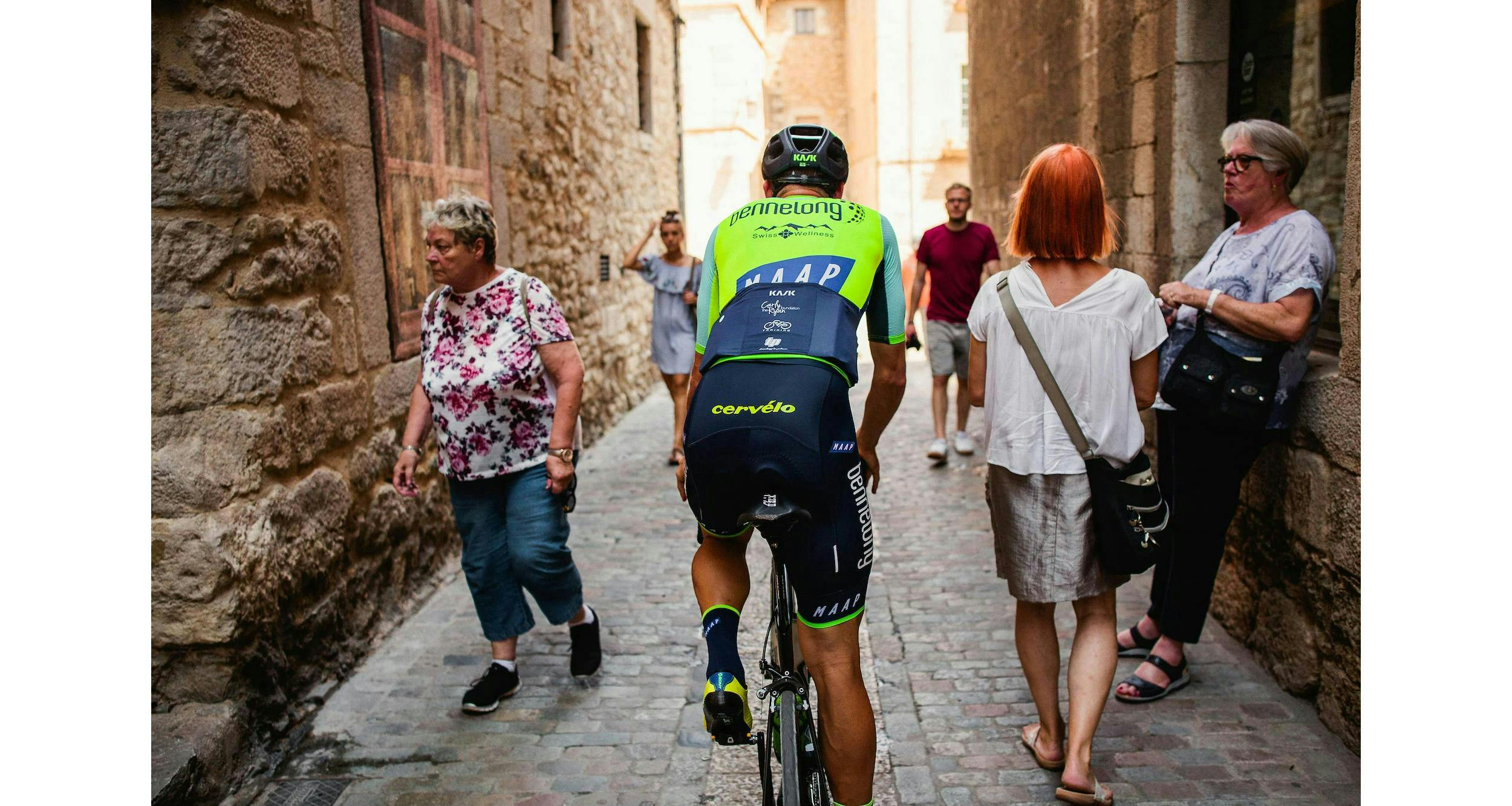

The Golden Moment
Steele von Hoff looked shocked as he crossed the finish line. The Gold Coast crowd erupted into a wave of sound. Von Hoff punched the air, almost cautiously, with his trademark bent elbow.
“The first thing that popped into my mind was, I wonder how many people were in the breakaway up the road,” he says, “because this just doesn’t happen. I can’t just come back and win the biggest race of my career.”
“I was in shock. I wanted confirmation from someone that I had won. Then I saw Emma, my girlfriend; she was screaming her heart out, she was a mess. I knew then that I had done it. I was Commonwealth Games champion.”
Later, as he stood on the top step of the podium, he remembers thinking back to only two weeks earlier. Back to when he could barely turn his head. He thought about Emma, how she had to help him out of bed nearly every day in the first week after the accident. Back to his first ride on the road, still strapped in a back brace. He could see the concern on his mother's face once again. Like a wave, it all washed over him.
“Having Mum, Dad and Emma – those people who really knew where I was at 7 weeks ago – at the finish line to watch me win, was something truly special,” he says.
“It’s a moment I’ll never forget.”
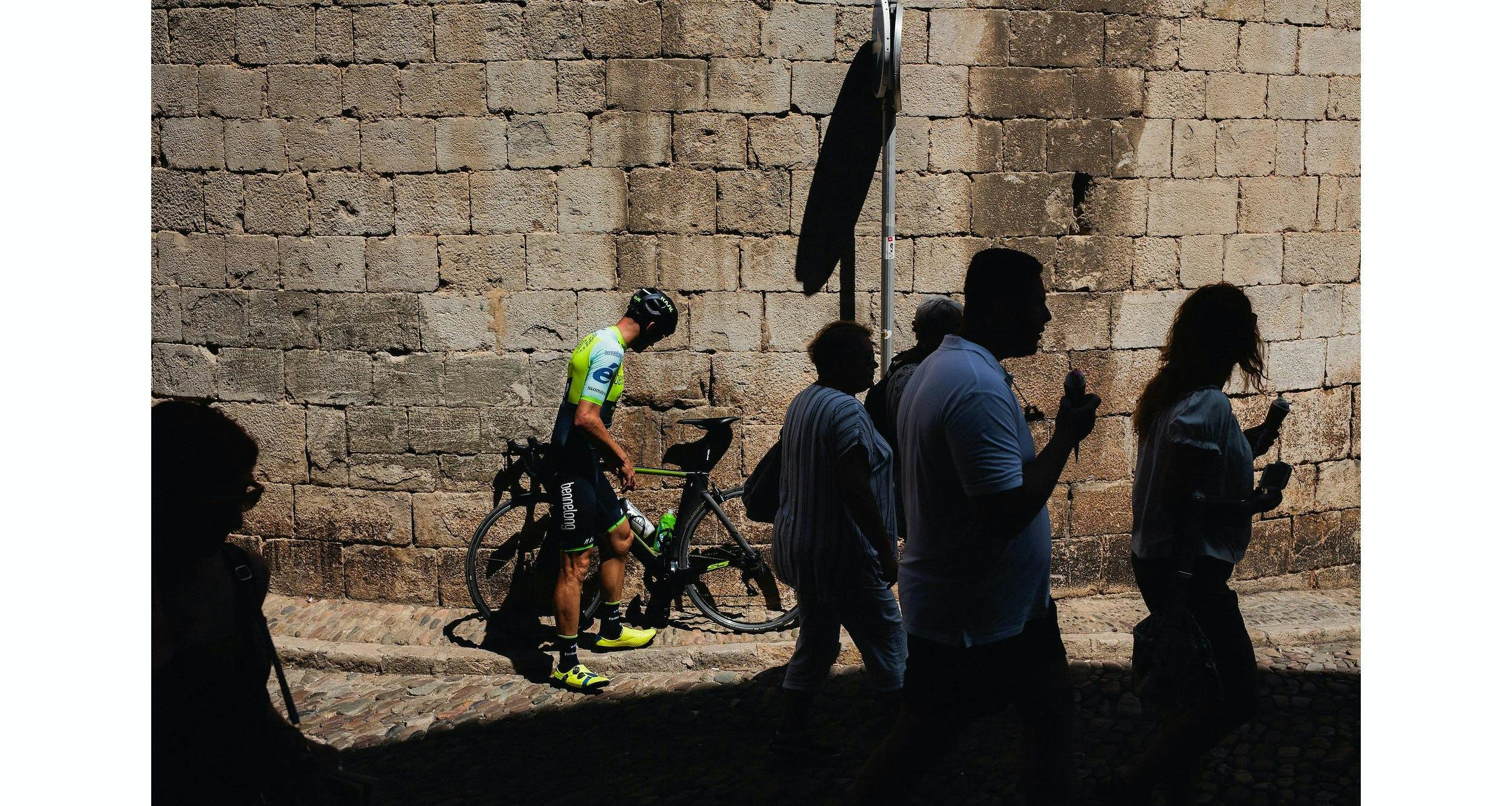

The Long Road
Von Hoff’s victory in the Commonwealth Games wasn't a breakthrough result in the normal sense. He has already proven himself against the best. He’s previously won a stage of the Tour Down Under and has taken a convincing sprint victory in a stage of the Tour of Norway. Yet, the gold medal is also not a full stop to a career at its end. Rather, it’s a powerful highlight in a long journey of success, struggle, and determination.
Von Hoff started his road cycling career with the then Genesys Wealth Advisers in 2011. He went on to race in the World Tour with Garmin-Sharp (now Team EF EducationFirst–Drapac) for two seasons. He raced in the professional continental circuit with the One Pro Cycling team in 2016.
In 2018, back under the guidance of Andrew Christie-Johnston, he returned to where it all began. Bennelong SwissWellness, the team that gave him his first break all those years ago, represented a new opportunity.
“I knew that Bennelong was a team that would give me the support I needed. They’d give me chance to get back to achieving results that I know I capable of,” he tells me.
Von Hoff has experienced all the highs and lows that can come with life as a professional cyclist. A place where everything can become about signing that next contract. Fighting for results and balancing personal ambition with team goals. Living most of the year out of a suitcase, staying at hundreds of hotels. All the while, trying to hold onto the reason why you started riding in the first place.
“I was slipping into a mindset where I wasn’t enjoying cycling as much as I knew that I should be,” he says. “But being back with Bennelong SwissWellness, I’ve got that enjoyment back. It makes such a difference.”
“I wouldn’t be Commonwealth Games champion if wasn’t for Bennelong,” he says. “And I’m not just saying that. Without the races and opportunities that they gave me at the start of the year, I wouldn’t have ever been selected.”
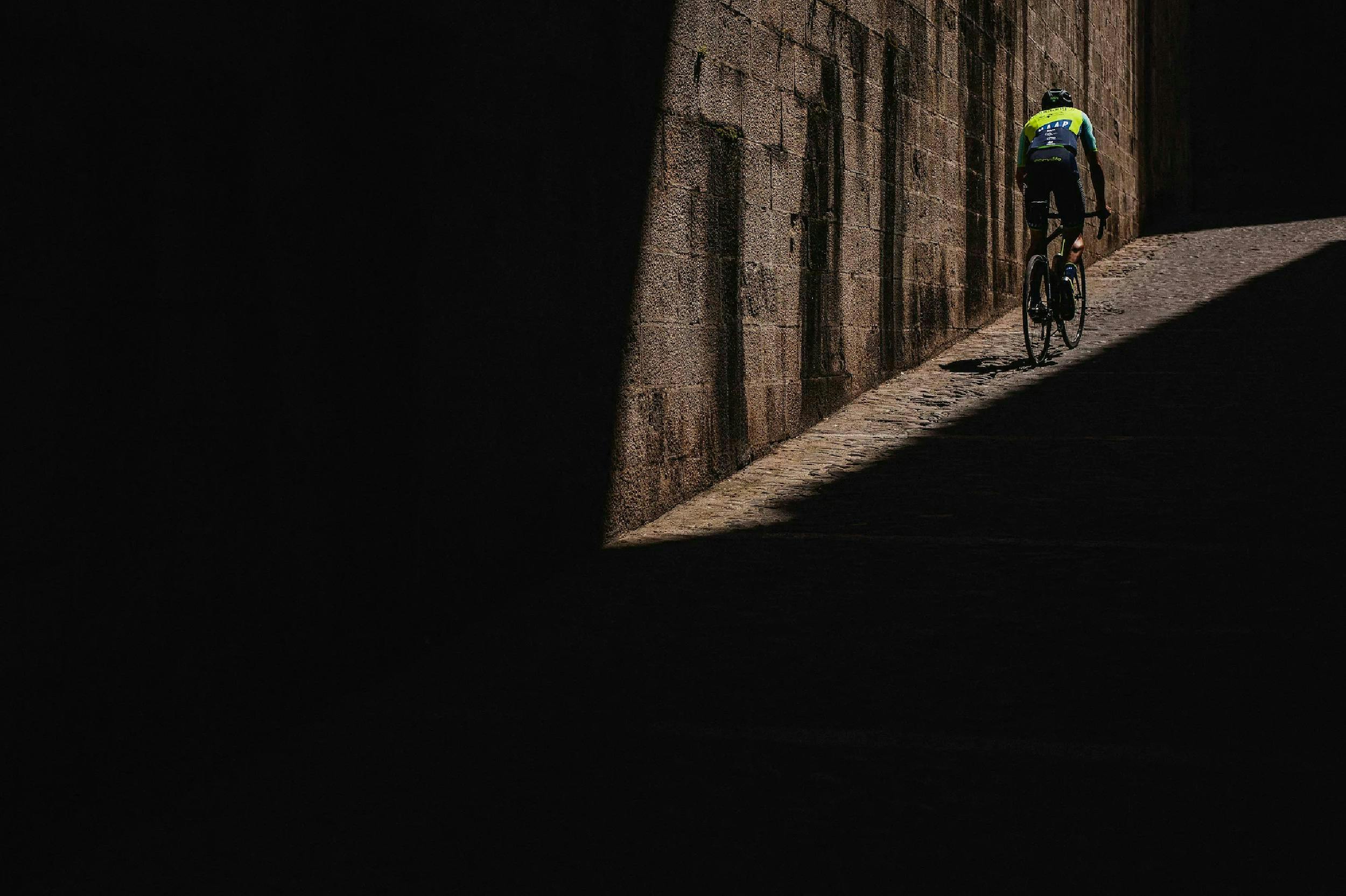

Lightening Strikes Twice
Ten weeks after winning the Commonwealth Games, von Hoff is close to the front of the peloton. He’s racing the Grote Prijs Marcel Kint in Belgium. The narrow European road squeezes the bunch. It’s 3 km to go. A sprint finish awaits. Von Hoff’s moment has arrived, or so he thinks.
A rider on the right-hand side of the peloton tries a desperate move along the footpath next to the road. The speed is punishing. von Hoff hits over 60km/h, the roads blurs beneath him.
One second. It’s all it takes. The rider on the footpath tries to dart back onto the road through a thicket of trees. Crack. He miss-times his approach, slamming into the second tree.
“It only takes one guy making a stupid decision, and half of the remaining guys in the peloton were on the deck,” von Hoff tells me.
“I tried to avoid the pile up and thought I just made it through,” von Hoff says. “But then, the bike of the guy next to me just crossed my path. I ended up hitting the deck and sliding into a tree on the other side of the road.”
“I felt the crunch, and I knew, I wasn’t getting up to finish the race.”
After the return from a broken back, to the starry heights of becoming Commonwealth Games champion, von Hoff’s world was flipped on its head once more. The crash left the Victorian with two newly fractured vertebrae, a broken rib and scapula.
“It was a bit of a blow mentally having a major crash again,” he admits. “I knew I was going to be out for a long time until I recovered properly. That was the European block over for me.”
It was another scary moment and another serious injury. Another blow. Von Hoff knew he needed to focus on his recovery more than anything else now. He needed to give himself time to mend properly. But, there are always new goals in the horizon.
“Next on the cards is China. I will head there on my way home from Europe,” von Hoff says. “I really hope I can get some wins there for the Bennelong SwissWellness squad. For the missed chances in Europe.”
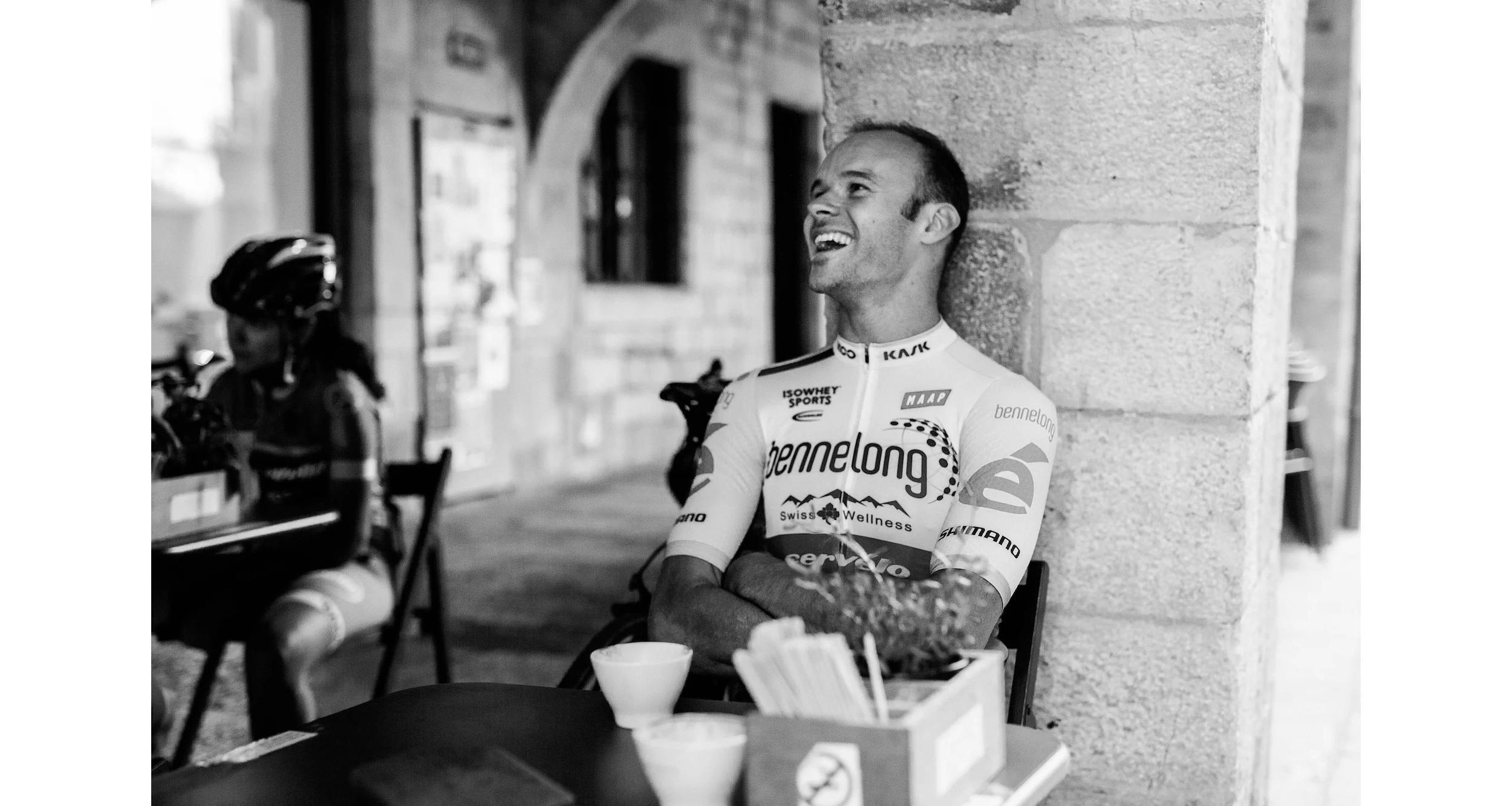

“The fire is certainly still there,” von Hoff tells me. “And I think it will always be there with me.”
“I just love racing my bike, as simple as that.”
It’s during these hardships that you can truly see the champion that Steele von Hoff has become. You can see the weeks of recovery and rehab he went through after his initial fall in February. His unwavering determination in the pursuit of a dream. You see his adversity and then him beating it. You see his arms outstretched on the podium at the Commonwealth Games. His years of hard work; the setbacks, the triumphs, the crashes and the glory.
Then, you see his smile. A smile, that despite it all, he has never lost. Not for a single minute. And you see his love for cycling, and that fire within him that refuses to dim.
THE MAKING OF A CHAMPION
Steele von Hoff and an Unbelievable Sequence of Events
We recently caught up with Steele von Hoff in Girona, Spain to unpack an unbelievable sequence of events that occurred between February and June of this year.
This is a story illustrating how cycling is a sport that is lived in moments. Moments that reach the high peaks of triumph and moments that fall to the deep lows of defeat and misfortune. And when there’s no warning when the tide shifts, everything can change in the blink of an eye. It’s what we do in those moments that define us.
A LOST MEMORY
Steele von Hoff can’t remember the moment he first broke his back. He has a memory of seconds before the crash, when he is riding at 50 km/h. He can recall the feeling of his bike as it leaned into the gutter. The wind, strong and gusty on his side. But then, when it happened, he has only a memory of black right in front of his face.
A series of rapid flashes follow. The loud crunch of crashing bikes and carbon. The world spinning around. And a snapshot of the tarmac where he lay, gasping for breath.
“I still only have snapshots… I must have landed straight on my head, given the look of my helmet. And how concussed I was,” von Hoff says.
It’s April, 2018. Von Hoff is talking to me over the phone. He’s at Melbourne Airport, waiting to board a flight to Europe. The buzz from an airport announcer interrupts us every few minutes. He hasn’t had a moment of rest in the last 48-hours.
“It’s crazy,” he says, “this just doesn’t happen. But, it’s real. It’s right here in my bag.”
He is, of course, referring to the Commonwealth Games gold medal he had won only days earlier.
Speaking to him, I can hear the disbelief in Von Hoff’s voice. He tells me that it feels like a dream. But the gold medal, tucked safely in his bag, reminds him of his reality. He is the 2018 Commonwealth Games Road Race champion.
It is a far cry from where Von Hoff was only seven weeks before the Games, on the ground at the local Sandown criterium circuit with six broken vertebrae – two in his neck and four in his thoracic spine. In a matter of seconds, whilst racing his local criterium, his dream of representing Australia on the Gold Coast was thrown up into the air.
Von Hoff explains how he now relies on the memory of others to put together the events directly after the fall. He was told that he had walked around heavily concussed and went to check on the woman who had also fallen. He has some fragmented memory of hanging onto the barriers, arched over, and not being able to breathe.
“It’s hazy. But I do remember seeing my glasses frame and then my glasses lens, five metres apart on the ground. And I couldn’t understand why. I couldn’t work it out.”
“The next thing I remember is a paramedic’s face in front of mine, and him telling me, it’s okay I'm going to look after you.”
Later, in the ambulance, von Hoff kept asking the same question over and over again. ‘Who's selected for the Commonwealth Games? Who's selected for the Commonwealth Games?’
He had received the call a few days earlier. He had been selected in the Australian team for the Commonwealth Games Road Race. It was a dream come true. But now, concussed, Von Hoff wasn’t sure if the memory was real or imagined. Was the team public yet? So he asked, over and over again, until it was confirmed he had indeed been selected. Whether he would actually race or not was now another question entirely.
AN UNBROKEN SPIRIT
After arriving at the hospital, von Hoff started to get worried. He didn’t just have a bruise or skin-off his body, like so many crashes before. He could tell that this was far more serious.
“I was laying there, unable to really move. And I remember thinking to myself: Okay, I haven’t lost any feeling. Nothing was numb. That’s good. I might be alright, I thought, I might not be too badly injured.”
The doctors returned with von Hoff’s scans and results. They told him that, along with the concussion, he had six different broken vertebrae. He recalls a sinking feeling, deep within his stomach, suddenly weighing him down.
“It was so disheartening. It isn’t an injury you can normally just bounce back from. Initially, I just thought, that’s me potentially done.”
He began thinking about taking on more work. He had been working as welder since he returned to Australia at the start of the year, and maybe he could do more hours there. He was still concussed, but even then he quickly realised: he couldn’t do that. There was no way he could lift anything.
“I had nothing else I could do, so I decided right then – ‘I am just going to keep pedalling. I have to keep pedalling.’”
Still strapped to the bed, von Hoff made some phone calls. He organised for a recumbent bike to be delivered to his house. He needed it there, ready for his return home.
“Once I got to the point where I could walk again, and I could go to the bathroom on my own, I knew I could get back to spinning the legs,” he says. “Within six days of the accident, I was on the recumbent, turning my legs over again. It’s all I could do.”
The weeks that followed, however, were not a motivational ‘Rocky’ montage. Von Hoff was in a bad way, and recovery was a painful and mentally fatiguing process. Looking back on that time, von Hoff reflects that there were moments when it all seemed too much.
“There were times when I wanted to throw in the towel because I was in such a bad way,” he tells me. “There were just a few moments when I had to call my coach Fenz [Mark Fenner], and just chat with him about everything, to help me get by.”
Von Hoff says it was these calls with his coach, Mark Fenner, that helped him maintain his belief in himself. Fenner gave him the motivation he needed and reminded von Hoff that so many people were in his corner supporting him. So, he kept pedalling. He went to the physiotherapist twice a week. He did his exercises every day, morning and night. Every waking moment became about returning to fitness and having proper movement.
“There was no way I could give in.”
THE GOLDEN MOMENT
Steele von Hoff looked shocked as he crossed the finish line. The Gold Coast crowd erupted into a wave of sound. Von Hoff punched the air, almost cautiously, with his trademark bent elbow.
“The first thing that popped into my mind was, I wonder how many people were in the breakaway up the road,” he says, “because this just doesn’t happen. I can’t just come back and win the biggest race of my career.”
“I was in shock. I wanted confirmation from someone that I had won. Then I saw Emma, my girlfriend; she was screaming her heart out, she was a mess. I knew then that I had done it. I was Commonwealth Games champion.”
Later, as he stood on the top step of the podium, he remembers thinking back to only two weeks earlier. Back to when he could barely turn his head. He thought about Emma, how she had to help him out of bed nearly every day in the first week after the accident. Back to his first ride on the road, still strapped in a back brace. He could see the concern on his mother's face once again. Like a wave, it all washed over him.
“Having Mum, Dad and Emma – those people who really knew where I was at 7 weeks ago – at the finish line to watch me win, was something truly special,” he says.
“It’s a moment I’ll never forget.”
THE LONG ROAD
Von Hoff’s victory in the Commonwealth Games wasn't a breakthrough result in the normal sense. He has already proven himself against the best. He’s previously won a stage of the Tour Down Under and has taken a convincing sprint victory in a stage of the Tour of Norway. Yet, the gold medal is also not a full stop to a career at its end. Rather, it’s a powerful highlight in a long journey of success, struggle, and determination.
Von Hoff started his road cycling career with the then Genesys Wealth Advisers in 2011. He went on to race in the World Tour with Garmin-Sharp (now Team EF EducationFirst–Drapac) for two seasons. He raced in the professional continental circuit with the One Pro Cycling team in 2016.
In 2018, back under the guidance of Andrew Christie-Johnston, he returned to where it all began. Bennelong SwissWellness, the team that gave him his first break all those years ago, represented a new opportunity.
“I knew that Bennelong was a team that would give me the support I needed. They’d give me chance to get back to achieving results that I know I capable of,” he tells me.
Von Hoff has experienced all the highs and lows that can come with life as a professional cyclist. A place where everything can become about signing that next contract. Fighting for results and balancing personal ambition with team goals. Living most of the year out of a suitcase, staying at hundreds of hotels. All the while, trying to hold onto the reason why you started riding in the first place.
“I was slipping into a mindset where I wasn’t enjoying cycling as much as I knew that I should be,” he says. “But being back with Bennelong SwissWellness, I’ve got that enjoyment back. It makes such a difference.”
“I wouldn’t be Commonwealth Games champion if wasn’t for Bennelong,” he says. “And I’m not just saying that. Without the races and opportunities that they gave me at the start of the year, I wouldn’t have ever been selected.”
LIGHTNING STRIKES TWICE
Ten weeks after winning the Commonwealth Games, von Hoff is close to the front of the peloton. He’s racing the Grote Prijs Marcel Kint in Belgium. The narrow European road squeezes the bunch. It’s 3 km to go. A sprint finish awaits. Von Hoff’s moment has arrived, or so he thinks.
A rider on the right-hand side of the peloton tries a desperate move along the footpath next to the road. The speed is punishing. von Hoff hits over 60km/h, the roads blurs beneath him.
One second. It’s all it takes. The rider on the footpath tries to dart back onto the road through a thicket of trees. Crack. He miss-times his approach, slamming into the second tree.
“It only takes one guy making a stupid decision, and half of the remaining guys in the peloton were on the deck,” von Hoff tells me.
“I tried to avoid the pile up and thought I just made it through,” von Hoff says. “But then, the bike of the guy next to me just crossed my path. I ended up hitting the deck and sliding into a tree on the other side of the road.”
“I felt the crunch, and I knew, I wasn’t getting up to finish the race.”
After the return from a broken back, to the starry heights of becoming Commonwealth Games champion, von Hoff’s world was flipped on its head once more. The crash left the Victorian with two newly fractured vertebrae, a broken rib and scapula.
“It was a bit of a blow mentally having a major crash again,” he admits. “I knew I was going to be out for a long time until I recovered properly. That was the European block over for me.”
It was another scary moment and another serious injury. Another blow. Von Hoff knew he needed to focus on his recovery more than anything else now. He needed to give himself time to mend properly. But, there are always new goals in the horizon.
“Next on the cards is China. I will head there on my way home from Europe,” von Hoff says. “I really hope I can get some wins there for the Bennelong SwissWellness squad. For the missed chances in Europe.”
“The fire is certainly still there,” von Hoff tells me. “And I think it will always be there with me.”
“I just love racing my bike, as simple as that.”
It’s during these hardships that you can truly see the champion that Steele von Hoff has become. You can see the weeks of recovery and rehab he went through after his initial fall in February. His unwavering determination in the pursuit of a dream. You see his adversity and then him beating it. You see his arms outstretched on the podium at the Commonwealth Games. His years of hard work; the setbacks, the triumphs, the crashes and the glory.
Then, you see his smile. A smile, that despite it all, he has never lost. Not for a single minute. And you see his love for cycling, and that fire within him that refuses to dim.